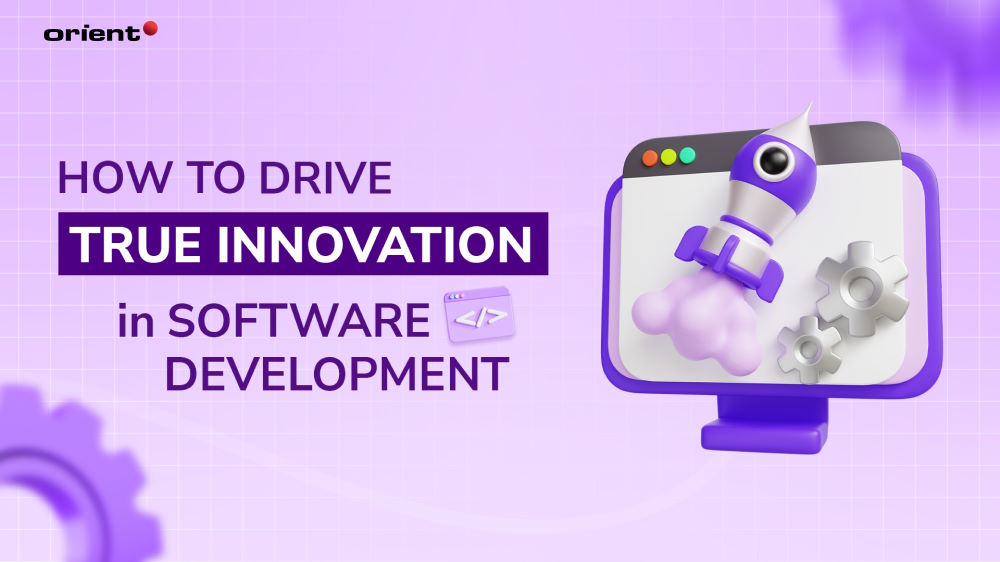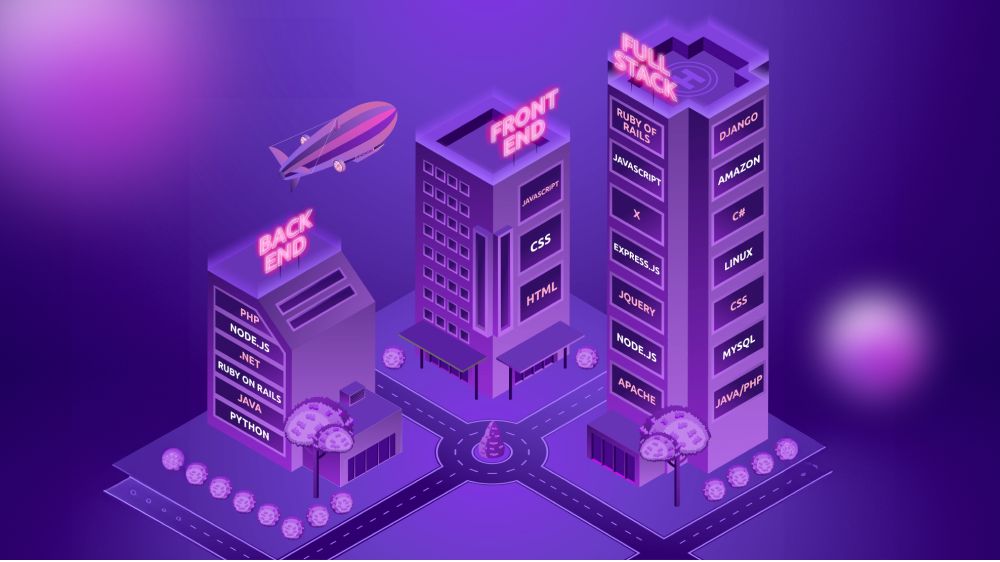An Insider Guide to Driving True Innovation in Software Development

Content Map
More chaptersInnovation is the critical differentiator in every field or industry, and software development is no different. Software engineering soon becomes a competitive crowded ground where a project’s success and failure depend on innovation. It paves the way for the final software solutions or services to go beyond normal expectations and deliver more value to its users. To survive and thrive in this domain, any IT organization has to either go hard and boost innovation to stay ahead of the curve or get drought by the sea of monotonous competitors.
However, driving true innovation in software engineering can be quite a tricky matter by all means. Thus, more companies decide to take a shortcut - to outsource the course of innovative endeavors to a third-party organization - the results are often unreliable and far from satisfactory. Given that you insist on going for the real stuff and making a name for yourself in the software development field, here’s what you need to consider.
How Do You Define Innovation in Software Development?

Put simply; it is pushing the normally accepted boundaries in the development lifecycle to boost the overall progress and create an altogether new and improved outcome. It involves introducing, developing, and implementing new ideas, technologies, methodologies, programming languages, and tools to bring about significant improvements or advancements during the process as well as software quality in the result.
More specifically, innovating activities can be anything that breaks down the limitations in the SDLC, like figuring out creative solutions to problem-solving, enhancing existing processes, adopting entirely new approaches to the project, or else.
What Is Holding You Back on Fostering an Innovative Development Process?

Innovation is not going to happen overnight. It is an extensive sequence of steps to nurture and prepare for creative breakthroughs, starting with a fertile environment, appropriate resources, and an open mindset. The ultimate goal is to set the developers to be efficient, productive, and willing to take risks and prosper. Any limitation in these components will likely act as a hindrance to limiting your development teams from innovation. Therefore, business owners and engineering managers need to know where they stand and what needs to be worked on first.
Heavy Workloads Due to Limited Resources
A software development project is an intricate and resource-consuming undertaking, and it requires consistent investments to ensure the teams access dedicated resources that enable them to explore different ideas, try new technologies, tools, etc. Therefore, it requires extensive research and development resources to make innovation a reality.
There may be multiple reasons behind the inadequate resources. Business owners may encounter budget constraints or grapple with squeezed cycle time. Or they suffer from talent shortage or cope with novice developers who lack the skills to conduct a proper project, not to mention jumping into innovation and creative thinking. In such situations, the burden is pushed on other team members who may not have the capacity to bear it.
Inadequate resource allocation coupled with overwhelming workloads exerts immense pressure on development teams, leading them to scramble to the finish line and create a mediocre outcome. And, of course, there would be no room for innovation at all. But worse, this is one of the leading causes of developer burnout and attrition. A survey indicates that 80% of developers acknowledge being burned out. The exhaustion affects not only the ability to innovate but also the way teams work and create quality outcomes.
The Gaps in Technology & Knowledge
A software developer or a team can have out-of-the-box thinking, but their efforts may come to an abrupt end if they have little or no access to knowledge of state-of-the-art technologies and tools. Whether it is a project of web development, app development, or else, technology is always the backbone of an efficient, avant-garde development process. And you know that technologies are growing and evolving at an unprecedented rate, even when you are reading this article. So, it will not be long until their ideas come crashing down without leaving a trace.
Accordingly, the gap in knowledge is a huge roadblock that traps your teams in a never-ending loop of research work and catch-up. Due to this, they often miss out on the opportunity to use advanced technologies to help to revolutionize the ways teams work and ease their workloads. What a shame! A fair understanding of current and emerging technologies (such as cloud computing, artificial intelligence (AI), machine learning, big data, blockchain, etc.) and a sharp mind toward upcoming trends is essential for the teams to bridge the gap and open the door to creative software development.
Fear of Failure & Resistance to Changes
“Farewell to the old and greeting to the new” is how innovation works to break the barriers of the old and embrace something more advanced. As a truth, it is never an easy decision to make changes to long-standing routines and practices. Such changes harbor the fear of taking risks and failure as a consequence.
When developers are scared of changing and working wrong, they tend to play safe and stick to what they are familiar with. This status not only contains engineers and stifles their creativity but also stunts growth and productivity overall, failing to get out into the wild and make any revolutionary move in their work. As a certain result, your development teams will collapse once the ideas start running thin or you demand something out of the ordinary to boost their progress.
Technical Debts & Outdated Legacy Systems
We have just mentioned the old-fashioned mindset is a major blocker to creative breakthroughs in development teams. However, it is not the only thing that drags them down to a standstill. The challenge of the outdated legacy system is no joke.
Most non-digitalized companies are tangled with old technologies and complex systems. These “legacy” organizations are stuck in a situation in which they have to pour huge amounts of resources into maintaining and adapting their existing systems to new technologies instead of exploring anything new or innovative. As a result, technical debts are the only thing set to increment. Not only is this an enormous burden on the development teams or projects, but also a massive setback to innovation.
Ways to Encourage Your Software Development Team to Take Risks and Innovate

To pave the way for innovation, you first need to eliminate the roadblocks mentioned above. After that, you can proceed to the methods and techniques to promote a creative development process for your software teams.
Cultivate a Culture of Innovation within Your Engineering Teams
A culture that values and encourages innovation should come on top of all. In such an innovation-friendly environment, software developers, project managers, and others altogether are exposed to enablers that create enough space and freedom for forward-thinking and out-of-the-box solutions:
- Open Mindset: As aforementioned, an open mindset is requisite for innovation. The culture encourages people to be receptive to new ideas, willing to take on challenges, step out of their comfort zone, and learn from past experiences. Your teams are permeated with critical manners of thinking, and they attempt to identify problems and work out different solutions instead of going the safe path. E.g., when writing code, engineers might think of two or more ways to reach a common destination in terms of coding standards, languages, and testing methods. Ultimately, they would determine the most effective way to get the job done and put the learning experience to work later on.
- Continuous Learning: Next is the learning mindset. An innovative culture creates conditions for people to harness their skills, broaden their knowledge, and keep up with the latest technology stacks continuously. This keeps your development teams from being out of date and sets them up for actionable strategies with greater returns.
- Cross-functional Collaboration: Innovation is about working smarter, not for any individual, but altogether. That’s why it is necessary to encourage communication and cooperation among members and across teams. This breaks the traditional siloes and allows everyone to be part of the innovation process - share knowledge and experience, come up with fresh ideas, and innovate together.
- Recognition & Rewards: Giving big bonuses for successful innovations or recognizing the achiever in front of all peers inspires software developers and motivates them to push their boundaries and take more ventures.
- Time for Exploration: It is common knowledge that time is valuable, but sometimes there needs to be a generous amount of time dedicated to exploration as it can open up new opportunities for creating dynamic ideas. In other words, give your development teams “thinking time.” No creativity is a result of rush. Instead, having enough time for brainstorming and experimentation allows them to explore different possibilities and use the most compelling logic to turn those creative ideas into reality.
Besides these, businesses nowadays tend to offer their employees a more flexible work model, such as flexible hours, hybrid or remote work. This gives employees more control over their time and allows them to use their creative juices more freely, thus creating a stimulating atmosphere for software development teams.
Stay on Top of Computing Programming Technologies
Investing in technology is never a mistake, and it stays a fact in this case. Staying up-to-date with the latest tech stacks, ranging from programming languages, frameworks, libraries, testing tools, IDEs, etc., not only accelerates the development process and ignites innovative ideas but also enables your software engineering teams to ease the workload and multiply the outcomes. How? Take low-code development as an example. Developers can reduce the amount of coding by reusing existing components such as APIs, UI libraries, pre-written code scripts, etc. In this way, teams can get a job done much faster without sacrificing the quality of the end product.
In addition, automation is a must for any step up to innovation. The advent of future AI-based models enables automating repetitive and manual tasks to the fullest; therefore, developers can leverage AI systems and tools to streamline their workflow and optimize the development cycle. Beyond some imaginations, AI can actually code by now. And this technology can do so much more. ChatGPT, for example, is a catchphrase ubiquitously spoken when it comes to AI technology in life. That’s why it is high time to get started with artificial intelligence if you would like to drive innovation.
Adopt Feature Flags in Development
Feature flags, also known as feature toggles or feature switches, are a technique used in software development that gives engineers the ability to control the delivery of new features and experiments without deploying them in production. Feature flags enable teams to test features with Beta Testers, deploy code instantly at any stage of their development lifecycle without having to go through the entire process from scratch, and roll back a feature in case of any unexpected developments.
This way, businesses can speed up innovation by releasing products faster while keeping up with the highest product quality standards. With Feature Flags, teams can practice continuous integration and delivery cycles without having to worry about any unexpected outcomes.
Outsource
The best way to innovate sometimes is to bring in a dedicated team of experienced professionals from outside when needed. Or you can delegate some specialized tasks or the entire project to an external company.
Software development outsourcing services are not solely meant to staff a project but to fill the technical gaps within a team and push the business forward to innovation. How can? Outsourcing enables you to leverage the powerful resource of experienced software developers to gain insights into new approaches and techniques, create a dedicated team for each task, or rapidly scale up your project as needed. This way, businesses like yours can capitalize on the knowledge and expertise that are unavailable in house. And additionally, outsourced teams and developers can phase in a fresh perspective to any project, paving the way for innovative thinking and, ultimately, state-of-the-art products.

If outsourcing is what you are in need of, Orient Software is your answer. At Orient, we present you with a complete range of software development services, including staffing and project outsourcing solutions. Behind us is a large pool and network of top tech talent in the IT industry in Vietnam – our base – as well as worldwide. For decades, we have constantly delivered great value to our esteemed clients – companies and organizations from all around the world and across industries; therefore, we know your expectations and can get the burden off your plate. Your success is our mission, so come and discuss with our consultants today.







